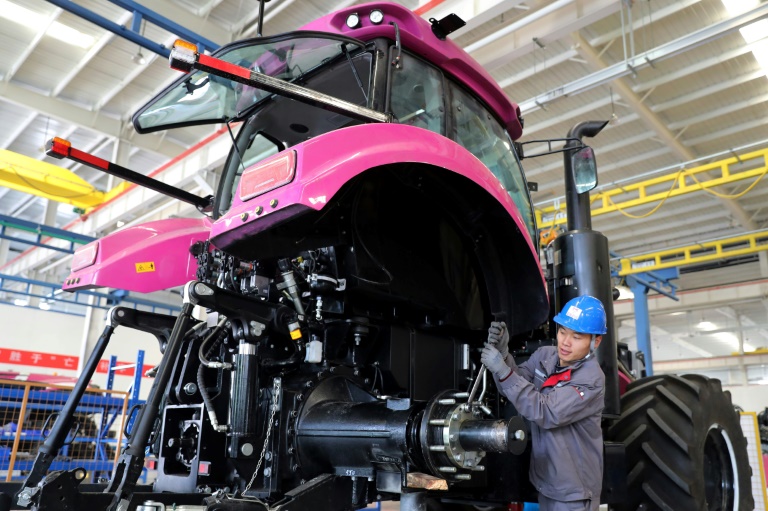Steps for creating a positive workplace culture in manufacturing

China’s manufacturing activity unexpectedly contracted in April, with the economy beset by a series of crises – Copyright AFP/File STR
Businesses in the manufacturing sector should take a more empathetic approach to employee wellbeing and culture, according to an industry insider.
This is approach is drawn out from a survey on culture in manufacturing conducted by O.C. Tanner. The manufacturing sector is one of many that has been under the microscope in recent years due to its male-dominated environment. Currently, women make up only 26 percent of the manufacturing workforce in the UK.
Beyond the uneven gender split and a reported lack of empathy in some businesses, employees in the sector report poor training and opportunities for upskilling, inadequate pay and benefits and an unsupportive culture.
However, there are businesses in the sector that are making positive workplace culture a priority. Digital Journal spoke to Leanne Matthew, HR Business Partner at cable assemblies manufacturer GTK, to find out how businesses in the sector can improve their internal culture and, as a result, their employees’ wellbeing. Along the way, Matthew cites several examples of what hr company is doing to address this matter.
Build a performance management culture – and reward success
60 percent of business leaders who prioritise performance management say they outperform their competitors. Despite this, 49% of employees say they don’t have regular performance conversations with their managers. Performance management offers benefits to both organisations and employees, including better business performance and stronger employee engagement.
Early in her role, Matthew prioritised putting a renewed performance management strategy in place, with a focus on:
- Regular, formalised one-to-ones as well as yearly reviews.
- Clear progression opportunities for employees performing well.
- Training and upskilling for employees looking to progress.
- Ensuring all teams and colleagues work to GTK’s overall goals.
Matthew comments: “It’s so important that our colleagues know what’s expected of them and what they should and can achieve in their roles. Then, at the end of the year, we look at how they’ve done. It’s always good to know when you’ve performed well and to get that recognition.”
She adds: “But it’s down to more than just getting that pat on the back. While that’s important for motivation, it’s also essential that there are continuous two-way conversations between our people and their managers.”
With a LinkedIn study finding that 94 percent of employees would stay at their business longer if they were confident it would progress their careers, the impact of progression opportunities is clear. Leanne comments: “We know we have a lot of talent, and we nurture it, develop it and put a lot of work into giving our people succession plans and roles to progress into.
Here Matthew comments: “As a medium-sized business, we recognise that progression is not endless. We find ways to manage expectations and identify opportunities for people performing well and looking to advance their careers. We’re seeing the benefits of this, as our staff turnover has almost halved in the past six months from 13.8 percent down to 7.7 percent, which is significantly lower than the sector average.”
Empower managers to identify struggling employees
Employees can experience mental and physical health conditions both in their personal lives and as a result of work. This is felt acutely in manufacturing, with 55.8 percent of the sector’s workforce reporting stress at work. The sector is ranked third for workplace stress levels behind only accommodation & food services and health and social care.
Matthew has spearheaded the introduction of an employee handbook at GTK, which will be launching this year. The handbook will include a formalised stress and mental health policy, plus a toolkit for managers that’ll help them proactively support struggling employees.
She comments: “We want our managers to be able to spot the signs of stress or poor mental health in their people. We’re building up a pool of resources for our managers to allow them to do that and support their people when they need it. They’re the first point of contact for their teams, so it’s important that they’re able to identify someone who may need more support.”
Furthermore, notes Matthew: “Sometimes, the hardest step a colleague can take is to proactively open up about stress or mental health concerns, so we recognise that this is a key way to provide support. In turn, it can actually make colleagues feel more comfortable in proactively opening up to their managers. A lot of our managers report that their people come to them in the first instance when they’re experiencing difficulties, so that’s a testament to the environment we’re creating together.”
Pay based on skills
Pay is one of the biggest reasons why manufacturing employees look to leave their jobs. This is the case across all manufacturing market sectors, including food, electronics and industrial.
Many employees have gripes with the perceived fairness of how pay rises are afforded; some businesses prioritise longevity over skills, leaving highly skilled workers at risk of leaving. According to Leanne, pay based on skills is the way to reward the most talented employees.
“We have some fantastic skilled operators on our manufacturing floor,” comments Matthew, “and the fairest way to compensate them is to pay based on that skillset and how well they demonstrate it at work.
“That, coupled with performance-related pay rises, is really key to showing our colleagues that we value the work they do.”
While internal culture, employee support and progression opportunities are vitally important to employees, 46% of workers in the sector say a salary increase or bonus would be their biggest motivating factor.
Offer an employee assistance programme (EAP)
Internal support from HR and leadership is so important for making employees feel valued and cared for, but Leanne recognises that colleagues need external avenues too. In some instances, employees don’t feel comfortable raising personal issues with managers or HR, so it’s important to have an external, qualified support option.
Matthew stresses the importance of offering support beyond mental health, which is understandably a support for many businesses at the minute. She says: “We recently changed our EAP because we recognised that it only focused on mental health but not any other areas. We also knew that uptake was low, so it likely didn’t meet our people’s needs. We take a holistic view of employee health and wellbeing and recognise that it goes beyond mental health. Physical health can sometimes be just as impactful, as good physical health can improve mental health, and vice versa. Then you have areas like financial wellbeing too.”
As well as offering professional support for mental and physical conditions, Matthew stresses the importance of offering above-and-beyond benefits for colleagues to reward their loyalty to the company. The EAP comes with additional offerings, including shopping vouchers, to give colleagues a well-rounded support and benefits programme.
Create family-friendly policies
GTK has a strong focus on employing the best people for its available roles, regardless of gender. But often, businesses in male-dominated sectors miss out on talented female workers due to a lack of supportive policies.
Family-friendly policies are a great way to demonstrate to talented women with families that you’re considerate of how other areas of their lives can impact their working lives.
“We’re committed to creating an environment where women know they’re going to be supported and that they won’t be penalised for their life and family choices”, comments Matthew. “We have a lot of women in leadership here, so this is an area we identified as a priority. Unfortunately, at many manufacturing businesses where women don’t have a seat at the table, this might be overlooked and that can put a lot of prospective female employees off.”
Communication
There’s one overarching theme to all of these tips and initiatives: two-way communication between management and employees. Matthew says: “Communication is so key. Whether that’s via regular one-to-ones, performance reviews or regular updates from senior management, it’s essential. If you don’t have it, your people might feel that they’re not important in your eyes.”
She concludes with: “Two-way feedback is essential too; we consulted our colleagues when we revised our EAP and everyone is reaping the benefits of that. Don’t be afraid of feedback. Listen to what your people want.”
Steps for creating a positive workplace culture in manufacturing
#Steps #creating #positive #workplace #culture #manufacturing





